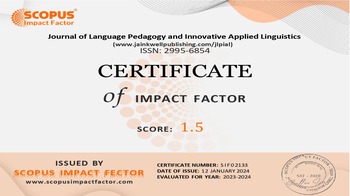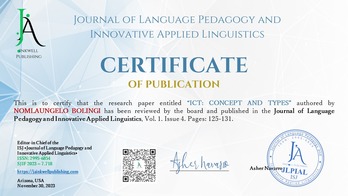Ways to Quickly Learn a Foreign Language
DOI:
https://doi.org/10.1997/zrrhgj05Keywords:
foreign language, independent study, socially active personality, methods of learning a foreign language, educationAbstract
The article delves into innovative and modern self-guided methods for acquiring foreign languages. These approaches seek to improve and expand current language skills by fostering independent skill development and self-assessment. Additionally, the article highlights the advantages and disadvantages associated with each of these language learning strategies.
Downloads
References
Galskova N.D. Theory of teaching foreign languages: Linguodidactics and methodology: textbook. allowance / Natalia Dmitrievna Galskova, Nadezhda Ivanovna Gez. - 6th ed., ster. - M.: Academy, 2014.
Ponarina N.N. The phenomenon of globalization in the interpretation of modern specific socio-humanitarian sciences // Historical and social educational thought. 2011. No. 3. P. 97-101.
Koryakovtseva N.F. Theory of teaching foreign languages: productive educational technologies: textbook / Natalia Fedorovna Koryakovtseva. – M.: Academy, 2015.
Ponarina N.N. Globalization and problems of culture // Society: philosophy, history, culture. 2012. No. 1. P. 11-14.
Petrov D.Yu. English language. Basic training. – M.: Labyrinth, 2014.
Vitselyarova K.N. Analysis of factors influencing employment in the Krasnodar region // In the collection: World science and modern society: current issues of economics, sociology and law: materials of the V international scientific and practical conference. Saratov, 2014. pp. 57-60.
Kholina O.I. Institutionalization of volunteering in the structure of Uzbek civil society // dissertation for the academic degree of candidate of sociological sciences / Krasnodar University of the Ministry of Internal Affairs of Russia. Krasnodar, 2012. Unique Research of the XXI Century 204
Frank I. We study according to the method of Ilya Frank. – M.: Vostok-Zapad, 2012.
Website "Duolingo.com". [Electronic resource]. - Access mode: https://www.duolingo.com
Begmatov, M. (2021). Infinitive Verbs and Their Grammar Functions in German Language. European journal of innovation in nonformal education, 1(2), 51-53.
Begmatov, M. (2019). About speech word in modern German. In 9th International Conference" Science and practice: a new level of integration in the modern world", Scope Academic House (pp. 32-35).
Begmatov, M. B. (2020). Features of the Organization of an Integrated Introductory Phonetic Course of German as a Second Foreign Language in a Non-Linguistic Higher Educational Institutions. Theoretical & Applied Science, (7), 265-268.
Каримова, Л., & Бегматов, М. (2022). Ҳозирги немис тилида иловали элементларнинг структур ўзига хосликлари. Современные лингвистические исследования: зарубежный опыт, перспективные исследования и инновационные методы преподавания языков, (1), 61-62.
Бегматов, М. (2022). Иловали конструкцияда тема ва рема муносабатларининг ифодаланиши. Современные лингвистические исследования: зарубежный опыт, перспективные исследования и инновационные методы преподавания языков, (1), 8-9.
Саидов, З., & Бегматов, М. (2022). Иловали элементларнинг асосий ифодага боғланиш усуллари ҳақида. Современные лингвистические исследования: зарубежный опыт, перспективные исследования и инновационные методы преподавания языков, (1), 25-26.
Саидов, З., & Бегматов, М. (2022). Илова конструкциянинг ўзига хос хусусиятларини ўрганишга доир. Ta'lim va rivojlanish tahlili onlayn ilmiy jurnali, 61-63.
Mukhtor, B. (2022). Using innovative and pedagogical technologies in German language classrooms. Academicia: An International Multidisciplinary Research Journal, 12(11), 35-39.
Mukhtor, B. (2021). The formation of derivative words from the bases of borrowed lexical units in the German language of the modern period. ACADEMICIA: An International Multidisciplinary Research Journal, 11(10), 1377-1385.
Примов, Б., & Бегматов, М. (2016). Аспектологические исследования в Узбекистане. Иностранная филология: язык, литература, образование, (3 (60)), 93-97.
Бегматов, М. (2016). Особенности явления эллипсис в немецком языке. Иностранная филология: язык, литература, образование, 1(2 (59)), 76-80.
Downloads
Published
Issue
Section
License
Copyright (c) 2023 Zaynab Shermamatova, Zarifa Ashurova, Dilafruz Tursunova (Author)

This work is licensed under a Creative Commons Attribution 4.0 International License.












